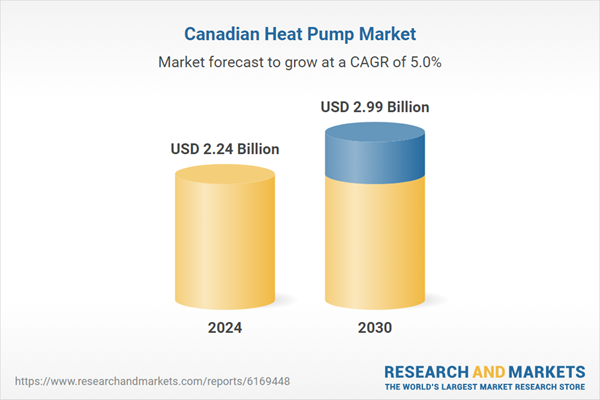Speak directly to the analyst to clarify any post sales queries you may have.
10% Free customizationThis report comes with 10% free customization, enabling you to add data that meets your specific business needs.
For instance, the Canada Greener Homes Initiative offers grants of up to USD 3638.25 and interest-free loans up to USD 29106 for eligible heat pump installations. Technological advancements, particularly in cold-climate heat pump models, have improved performance and reliability in Canada’s diverse weather conditions. Rising consumer awareness about long-term cost savings and eco-friendly heating and cooling solutions is further boosting demand. Additionally, growing interest in electrification and the transition away from fossil fuel-based systems are positioning heat pumps as a key component of Canada’s sustainable energy future.
Key Market Drivers
Government Incentives and Supportive Policies
The Canadian government, in collaboration with provincial and municipal authorities, has implemented a variety of incentives and policies to promote the adoption of energy-efficient heating and cooling solutions, with heat pumps as a key focus. Initiatives such as the Canada Greener Homes Grant, provincial rebate programs, and utility-based incentives provide substantial financial assistance to homeowners and businesses investing in this technology. Notably, the Canada Greener Homes Grant and the Oil to Heat Pump Affordability (OHPA) program have facilitated over 249,800 new heat pump installations nationwide as of April 2025.These measures significantly lower the upfront cost barrier, making advanced systems more accessible across income groups. Furthermore, Canada’s commitment to achieving net-zero emissions by 2050 has driven the introduction of stricter building codes and energy efficiency standards, encouraging the integration of heat pumps into both new builds and retrofits. The alignment of federal and provincial sustainability objectives creates a stable, long-term policy framework that strongly supports market growth.
Key Market Challenges
High Upfront Costs and Affordability Concerns
One of the primary barriers to wider heat pump adoption in Canada is the relatively high initial investment required for purchase and installation. Compared to conventional heating systems such as natural gas furnaces or electric baseboard heaters, heat pumps can cost significantly more, especially for advanced cold-climate models that include enhanced technology to perform in sub-zero temperatures. While government incentives and rebates help offset some of these costs, the remaining out-of-pocket expense can still deter price-sensitive consumers. This challenge is particularly evident in rural or lower-income communities, where budget constraints make it difficult to justify the investment despite the promise of long-term energy savings. Additionally, in certain regions where electricity rates are higher, consumers may question whether the operational savings will be sufficient to recover the initial expenditure, creating hesitation in adoption.Key Market Trends
Growing Adoption of Cold-Climate Heat Pumps (ccASHPs)
One of the most significant trends in the Canadian heat pump market is the rapid adoption of cold-climate air source heat pumps (ccASHPs). Historically, heat pumps struggled to perform efficiently in extremely cold conditions, limiting their appeal in many parts of Canada. However, advancements in inverter-driven compressors, enhanced refrigerants, and variable-speed fan technology have made modern ccASHPs highly effective, even at temperatures as low as -25°C.These systems are designed to maintain consistent heating performance without relying excessively on backup systems, making them viable for regions with harsh winters. Consumers are increasingly drawn to this technology as it addresses one of the key historical concerns about heat pump reliability. Manufacturers are also expanding their product ranges to meet diverse regional needs, while utility providers are incorporating ccASHP solutions into rebate and incentive programs. This trend is expected to continue as technology improves and awareness spreads among both residential and commercial customers.
Key Market Players
- Daikin Industries Ltd.
- Mitsubishi Electric Corporation
- Carrier Corporation
- Trane Technologies plc
- Johnson Controls International plc
- Lennox International Inc.
- LG Electronics Inc.
- Samsung Electronics Co., Ltd.
- Panasonic Corporation
- Fujitsu General Ltd.
Report Scope:
In this report, the Canada Heat Pump Market has been segmented into the following categories, in addition to the industry trends which have also been detailed below:Canada Heat Pump Market, By Type:
- Air Source Heat Pumps
- Ground Source Heat Pumps
- Water Source Heat Pumps
- Hybrid Heat Pumps
Canada Heat Pump Market, By Application:
- Residential
- Commercial
- Industrial
Canada Heat Pump Market, By End Use:
- Heating
- Cooling
- Hot Water Supply
Canada Heat Pump Market, By Region:
- Quebec
- Ontario
- Alberta
- British Columbia
- Saskatchewan & Manitoba
- Rest of Canada
Competitive Landscape
Company Profiles: Detailed analysis of the major companies present in the Canada Heat Pump Market.Available Customizations:
With the given market data, the publisher offers customizations according to a company's specific needs. The following customization options are available for the report.Company Information
- Detailed analysis and profiling of additional market players (up to five).
This product will be delivered within 1-3 business days.
Table of Contents
Companies Mentioned
The leading companies profiled in this Canada Heat Pump market report include:- Daikin Industries Ltd.
- Mitsubishi Electric Corporation
- Carrier Corporation
- Trane Technologies plc
- Johnson Controls International plc
- Lennox International Inc.
- LG Electronics Inc.
- Samsung Electronics Co., Ltd.
- Panasonic Corporation
- Fujitsu General Ltd.
Table Information
| Report Attribute | Details |
|---|---|
| No. of Pages | 87 |
| Published | September 2025 |
| Forecast Period | 2024 - 2030 |
| Estimated Market Value ( USD | $ 2.24 Billion |
| Forecasted Market Value ( USD | $ 2.99 Billion |
| Compound Annual Growth Rate | 4.9% |
| Regions Covered | Canada |
| No. of Companies Mentioned | 11 |









